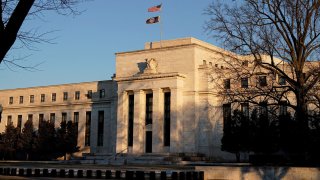
- As fears of an all-out invasion of Ukraine by Russia heighten, spikes in energy prices and knock-on economic effects could spell trouble for central banks.
- A number of major central banks have already begun the process of tightening monetary policy in an attempt to combat record-high inflation, but spikes in oil and natural gas prices could exacerbate the issue even further.
- "If oil and gas prices continue to drive higher, central banks may be forced to accelerate their pace of tightening," one strategist said.
LONDON — As troops enter eastern Ukraine and fears of an all-out invasion of the country by Russia heighten, the associated spikes in energy prices and knock-on economic effects could spell trouble for central banks.
Global markets were volatile on Tuesday and oil prices soared to seven-year highs after Russian President Vladimir Putin announced that Moscow would recognize the independence of two breakaway areas of eastern Ukraine and send troops into the region.
International economic sanctions started rolling in as a result. The U.K. initially slapped targeted sanctions on five Russian banks and three wealthy individuals, while Germany halted the certification of the Nord Stream 2 gas pipeline, designed to transport natural gas from Russia directly to Europe. European foreign affairs ministers met in Brussels on Tuesday to determine the EU's response.
Get Connecticut local news, weather forecasts and entertainment stories to your inbox. Sign up for NBC Connecticut newsletters.
The geopolitical uncertainty comes at a difficult time for the world's central banks. A number have already begun the process of tightening monetary policy in an attempt to combat record-high inflation, but spikes in oil and natural gas prices will likely exacerbate the issue even further.
The Bank of England fired the starting gun on raising interest rates last tear, and has implemented two hikes at its last two meetings, while the market is pricing in an imminent lift-off and aggressive hiking cycle from the U.S. Federal Reserve.
Money Report
The European Central Bank has lagged its peers in terms of a hawkish pivot so far, but is expected to begin tightening late in 2022, with euro zone inflation also running at a record high.
Euro zone money markets were pricing in a 10 basis point hike by June 2022 following the central bank's Feb. 3 meeting, with 50 basis points' worth of hikes expected by the end of the year. However, money markets on Tuesday showed investors' expectations for hikes had diminished slightly. They indicated around a 95% chance of a 10 basis point hike in July, with 40 basis points priced in by year-end.
"If oil and gas prices continue to drive higher, central banks may be forced to accelerate their pace of tightening with the potential for a double rate hike at March's lift-off date from the Fed," Victoria Scholar, head of investment at British retail investment platform Interactive Investor, said in a note Tuesday.
ECB divergence
ECB policymakers themselves have begun do diverge in their reactions to Russia's latest escalation. Austrian central bank Governor Robert Holtzmann suggested the ECB could make its first post-pandemic rate hike this summer before the end of its bond-purchase program.
Holtzmann also said a second rate hike could come before the end of the year, but the Austrian is seen as one of the more hawkish members of the ECB's rate-setting lineup.
Fellow policymaker and Bank of France Governor François Villeroy de Galhau said the ECB should keep its options open as it assesses the Russia-Ukraine crisis. This message was echoed on Wednesday by Lithuanian central bank Governor Gediminas Šimkus, who told CNBC that the ECB should maintain a "data driven, forward looking" approach to decision making in the face of the current scale of uncertainty.
"It should be reliable, it should be objective, it should fit our criteria, so let's wait for March when the decisions are to be taken and let's see what data we do have at that particular moment," Šimkus said.
He added that in order to retain its credibility, the ECB must align with its forward guidance, which set out that its asset purchase program would end before interest rate hikes begin.
"So I'm open to all and I'm flexible to all of these scenarios of the inflation dynamics but with that high uncertainty, we should wait and see what is happening exactly at the moment when decisions are taken, and then we should talk about this at that moment," Šimkus said.
Central banks have 'a blunt toolkit'
Hugh Gimber, global market strategist at JPMorgan Asset Management, told CNBC that the conflict in Ukraine could exert even more pressure on central banks, heightening the likelihood of a policy mistake.
"We knew, coming into 2022, that they [central bankers] faced a very difficult balance: tighten too quickly, slow the economy too far; tighten too slowly and risk losing control of medium-term inflation expectations," Gimber said Tuesday.
An invasion of Ukraine by Russia could ultimately deepen this confusion, he said, with higher energy prices continuing to push the expected inflation peak further out.
"Ultimately, I think the central banks are working with a relatively blunt toolkit here. Just as they couldn't solve semiconductor shortages last year, that were putting significant upward pressure on goods prices, nor can they solve higher energy prices via rate hikes this year," Gimber said.
JPMorgan expects central banks to prioritize growth over an aggressive attempt to drag inflation back toward targets. Gimber noted that history suggests relatively short-lived market sell-offs during geopolitical events, but recommended in the meantime that investors return to benchmark weighting while assessing the implications of potential conflict on oil prices and consumers.
'Straw that breaks the camel's back'
While higher energy prices are an inflationary force, the risk of conflict also brings to the fore concerns about recessionary pressures; it's creating an "increasingly complex conundrum" for central banks, according to Interactive Investor's Victoria Scholar.
Given this dichotomy, Matteo Cominetta, senior economist at Barings Investment Institute, warned that investors should position for even higher uncertainty and prepare for the possibility of policy mistakes.
With regards to Europe in particular, he said: "With inflation already testing ECB policymakers' nerves and credibility, it could be the straw that breaks the camel's back. The ECB could rush to the exit in its meeting next month, announcing a quick wrap up of its QE programs and signal a rate hike already in the summer."
"This could prove a mistake, as the invasion would likely hurt growth as well. Soaring energy prices would hit household and business purchasing power, confidence and willingness to spend and invest. Imports costs would rise more than export value, hurting the trade balance. The post-omicron recovery could well be weakened," he added.
Cominetta also highlighted that the cost of credit could be driven up in southern and eastern Europe, a trend already seen in the Baltic states, while eastern European central banks will also need to contend with a devaluation of their currencies.
"A Russian invasion would send their currencies sharply down, exactly the opposite of what central banks wanted, in a bid to control inflation," he said.
"Currency reserves will then have to be spent to prop up the currencies, stabilize inflation and maintain financial stability. Countries with low reserves, a negative current account and energy import dependency may find it hard to do so."






